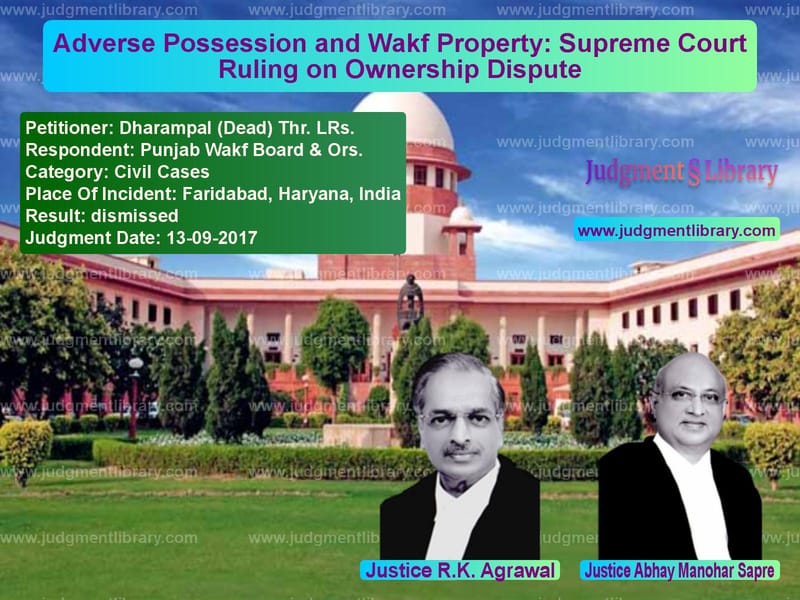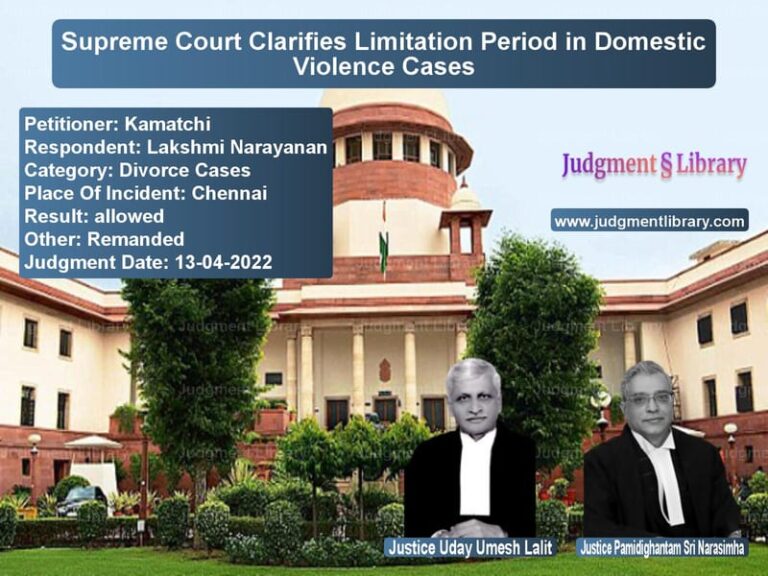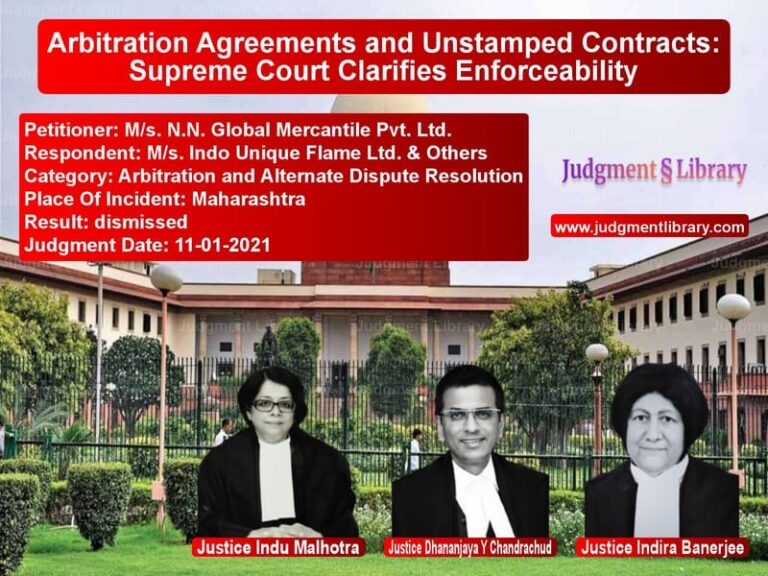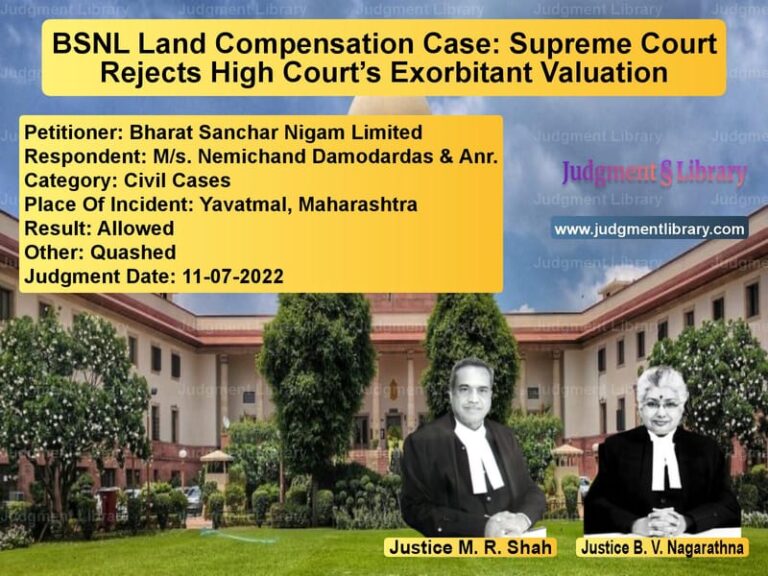Adverse Possession and Wakf Property: Supreme Court Ruling on Ownership Dispute
The Supreme Court of India, in the case of Dharampal (Dead) Thr. LRs. v. Punjab Wakf Board & Ors., addressed the issue of ownership and possession of Wakf property, particularly the plea of adverse possession by an occupant. This case revolved around a long-standing land dispute in Haryana and examined whether the appellant could claim ownership over the disputed land through adverse possession.
Background of the Case
The appellant, Dharampal, was the son of Ram Swarup, who had occupied a large parcel of land (54 Kanals and 13 Marlas) in Faridabad, Haryana. This land belonged to the Punjab Wakf Board, which had earlier leased part of it to other defendants for one year. However, after the expiry of the lease, the defendants continued their occupation.
The Wakf Board filed a suit in 1971 against Ram Swarup, seeking possession of the land, but this suit was dismissed in default in 1972. In 1991, the Wakf Board filed a fresh suit against Dharampal and others for possession and an injunction restraining them from changing the nature of the land. Dharampal, in his counter-claim, asserted ownership of the land based on adverse possession.
Legal Issues
The primary legal questions in this case were:
- Was the suit barred under Order 9 Rule 9 of the Civil Procedure Code (CPC) because of the previous dismissal?
- Could Dharampal claim ownership of the land based on adverse possession?
- Did the jurisdiction of the civil court stand barred under the Wakf Act?
Arguments of the Appellant
The appellant, Dharampal, argued:
- That the suit filed in 1991 was barred under Order 9 Rule 9 of the CPC, as the earlier suit filed in 1971 had been dismissed in default in 1972.
- That he and his father had been in continuous possession of the land since 1953, and he had acquired ownership by adverse possession.
- That the suit was barred under Section 55-C of the Wakf Act, 1954, as the jurisdiction over the dispute was with the Wakf Tribunal and not the civil courts.
Arguments of the Respondents
The Punjab Wakf Board, in response, contended:
- That the dismissal of the 1971 suit did not bar the fresh suit as it was not dismissed under Rule 8 of Order 9 of the CPC.
- That adverse possession could not be claimed as the Wakf Board had repeatedly asserted its ownership, including by filing suits in 1971 and 1991.
- That the amendments to the Wakf Act barring civil court jurisdiction were never brought into effect and were eventually repealed.
Supreme Court’s Analysis
On the Bar Under Order 9 Rule 9 CPC
The Court held that the bar under Order 9 Rule 9 did not apply as the previous suit was dismissed under Rule 3, which allows the filing of a fresh suit. Additionally, the present suit involved more defendants than the previous one, which further distinguished it.
On Adverse Possession
The Court relied on precedents, including Gurdwara Sahib v. Gram Panchayat Village Sirthala (2014), which held that adverse possession cannot be used as a basis for ownership in a counter-claim. The Court also cited T. Anjanappa & Ors. v. Somalingappa & Anr. (2006) and Chatti Konati Rao & Ors. v. Palle Venkata Subba Rao (2010) to emphasize that mere long possession does not constitute adverse possession. The Court stated:
“Mere possession, however long, does not necessarily mean that it is adverse to the true owner. The possession must be open, hostile, and continuous for the statutory period.”
The Court found that the Wakf Board had been contesting the possession through litigation, which disrupted the continuity required for adverse possession.
On the Jurisdiction of Civil Courts
The Court noted that while amendments to the Wakf Act in 1984 barred civil court jurisdiction, these amendments were never notified. The entire Act of 1954 was later repealed by the Wakf Act, 1995, meaning that the civil court had jurisdiction when the suit was filed.
Final Judgment
The Supreme Court dismissed Dharampal’s appeal, upholding the decisions of the lower courts, and ruled:
“The appellant failed to establish adverse possession, and the suit was not barred by procedural rules or jurisdictional limitations. The Wakf Board remains the rightful owner of the land.”
Conclusion and Impact
This judgment clarifies the limitations of adverse possession claims against Wakf properties. It reinforces the principle that adverse possession cannot be claimed against an entity that continuously asserts ownership. Additionally, it confirms that procedural dismissals of earlier suits do not automatically bar fresh suits if different parties or causes of action are involved.
The ruling ensures that Wakf properties remain protected from unauthorized encroachments and strengthens legal safeguards for religious and charitable institutions managing such properties.
Don’t miss out on the full details! Download the complete judgment in PDF format below and gain valuable insights instantly!
Download Judgment: Dharampal (Dead) Thr vs Punjab Wakf Board & Supreme Court of India Judgment Dated 13-09-2017.pdf
Direct Downlaod Judgment: Direct downlaod this Judgment
See all petitions in Property Disputes
See all petitions in Landlord-Tenant Disputes
See all petitions in Specific Performance
See all petitions in Judgment by R K Agrawal
See all petitions in Judgment by Abhay Manohar Sapre
See all petitions in dismissed
See all petitions in supreme court of India judgments September 2017
See all petitions in 2017 judgments
See all posts in Civil Cases Category
See all allowed petitions in Civil Cases Category
See all Dismissed petitions in Civil Cases Category
See all partially allowed petitions in Civil Cases Category







